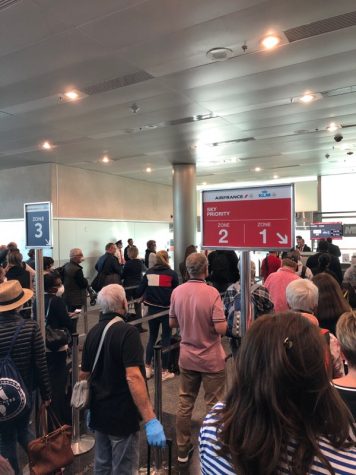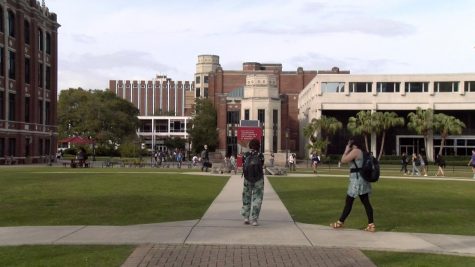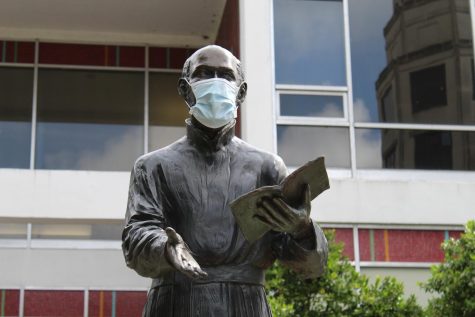Loyola’s international students struggle to make plans, get home
French Study Abroad student Mathilde Caut,on the left, poses in front of Loyola. Caut was one of the many students who had her exchange abrupted due to COVID-19. Photo courtesy of Mathilde Caut.
March 22, 2020
Like most others at Loyola, international students were shocked to learn that on-campus classes had been cancelled for the rest of the Spring semester due to the spread of COVID-19.
But unlike other Loyola students, many international students were also shocked to learn that their native countries were closing borders and that their on-campus housing was no longer guaranteed, despite being thousands of miles away from home.
This was the reality for biology pre-health senior and Nigerian native Glory ‘Tomi’ John.
As a senior, John was looking forward to commencement and the idea that her Nigerian family, who she has rarely seen the last four years, would travel to watch her graduate. But with COVID-19’s derailment of expected realities, she said her dream of commencement and seeing her family soon, has been dimmed.
“It’s saddening that first my family is most likely not going to see me walk across the stage and I wouldn’t walk with my friends who are actually not coming back in the fall,” John said.
To finish her online classes, John was planning to stay on campus. However, when she received the email from Loyola President Tania Tetlow advising students who were not homeless; didn’t have a family member with the virus; or were unable to return to their country, to empty the residence halls within the week, her plans were diverted.
“I was like, okay, at least I will be able to get an extended summer in Nigeria, and I was looking at the flights and even if local flights are cheap, international flights are definitely not,” John said.
After considering the work it would take to pack up her dorm and move away quickly, John said it became clear that returning home to Kaduna, Nigeria was not an option. For now, John said she will temporarily stay with her host family in Atlanta, Georgia, a place she has stayed between breaks over the last four years.
French study abroad senior Mathilde Caut was also planning to stay on campus where she had elected to self-isolate, but after the French Embassy told her that she had to leave immediately or risk being stuck in the United States until September, Caut bought an expensive, one-way ticket back to Paris.

When Caut does return to France however, she said she is not necessarily guaranteed travel back to her hometown in the South of France.
“One of my flights is already cancelled,” Caut said. “I tried to get a train, it might be cancelled too. But I think there’s one flight a day, so I should be able to catch one.”
In the event that Caut can’t return home, she said that she has family in Paris that will be able to shelter her.
Despite the stress, she said she is glad to be returning back home.
“I’m scared to get the coronavirus though and to contaminate more people too,” she said.“But I feel good knowing that I’m going to be at home and with my family even if it’s not better for my health.”
Physics Junior Josh Leaney shares Caut’s sentiment of feeling relieved to go back home to Brisbane, Australia despite the spreading virus.
“I’ll feel more protected in the sense that all of my health insurance back home will cover me,” Leaney said. “I feel like my parents would do almost anything for me so there is no threat of financial insecurity.”
Leaney, like Caut and John, planned to stay on Loyola’s campus for what he called “the long haul”, but said he had to abruptly return home because he would not have qualified to stay on campus once Tetlow updated students.
“I have to travel home because my country does not have a travel ban placed on it. But, it’s a great financial expense and also a 24 hour flight,” Leaney said. “I will be missing class and now I’m out of pocket.”
For Leaney, the struggle has been preparing to leave while also having to balance online classes.
“After talking with my parents they said, ‘get everything done and then, you can focus on the other stuff and get extensions for everything else because they’ll understand,’’’ Leaney said.
Moving off campus has also made John feel unsettled about how she will be able to provide for herself and stay on top of schoolwork, she said.
“I’m just really concerned once I’m not on campus, what do I have access to? I can’t work off campus,” John said. “How am I going to fend for myself in that sense as an international student who is going to remain in The United States.”
Both Leaney and John expressed frustration about being forced to move off-campus, especially with increased international flight prices and a short amount of time to leave.
Leaney said that while he understands why Loyola would not allow all international students to stay on-campus, he feels annoyed.
“I’m not mad at the fact I have to leave, I’m just a little frustrated that they are not more accommodating to the international students who although may not have travel bans placed on their country, have to travel exceedingly far,” Leaney said.
Director of Loyola’s Center for International Education, Debbie Danna, said the restriction of the amount of students who could stay on campus was in the best interest of the campus community.
“New Orleans is now experiencing a higher rate of community spread of COVID-19 than expected and by practicing social distancing and having our students return home, we are minimizing risk of contagion and community spread; relieving burdens on police, Residential Life, and essential staff; and ensuring that public health resources remain available for those most in need,” Danna said.
John said that the “timing of revealing information to the students has been very chaotic,” but she said she acknowledged that Loyola was most likely communicating while they received information.
To help students leave on short notice, Danna said, the university has been helping students store their belongings and make travel arrangements.
Caut said that while she was on campus she has been treated well by students who have been donating food to her and by staff who continued to accommodate students at the Orleans Room and other on-campus services.
“I would like to thank them because they didn’t do the perfect job ever, but they did their best,” Caut said.“That’s really great that they let us stay here since we can’t go anywhere else.”
While John voiced her frustration with the quick deadline to move out, she said that she is hopeful that the university would accommodate students like Caut who had nowhere else to go.
I love how Loyola has handled the whole situation in terms of allowing the students to stay,” John said. “I’m just hoping that they’ll continue to be considerate because there are people that literally cannot go back to their countries and just be welcoming.”
















